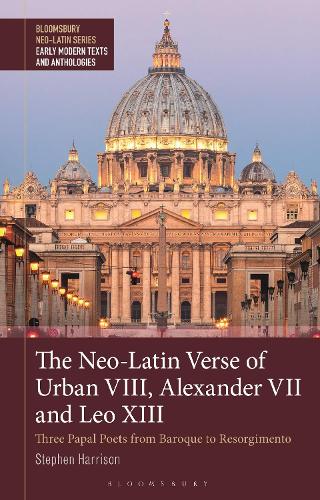
The Neo-Latin Verse of Urban VIII, Alexander VII and Leo XIII: Three Papal Poets from Baroque to Resorgimento
(Hardback)
Available Formats
Publishing Details
The Neo-Latin Verse of Urban VIII, Alexander VII and Leo XIII: Three Papal Poets from Baroque to Resorgimento
By (Author) Stephen Harrison
Bloomsbury Publishing PLC
Bloomsbury Academic
2nd May 2024
United Kingdom
Classifications
Professional and Scholarly
Non Fiction
European history
Ancient, classical and medieval texts
Roman Catholicism, Roman Catholic Church
871.0409
Physical Properties
Hardback
288
Width 140mm, Height 218mm, Spine 22mm
460g
Description
A fascinating insight into the most talented Latin poets to occupy the Papal throne after Pius II Piccolomini in the 15th century, this book offers translations of and commentaries on the major poems of the three popes (all Italians): Urban VIII Barberini, Alexander VII Chigi and Leo XIII Pecci. Their highly accomplished Neo-Latin poems owe much to the major Latin poets and are significant instances of classical reception, but also cast an interesting light on their lives, times and papacies. Urban (elected pope in 1623) published a mixture of secular and religious verse, drawing on the hexameter epistles of Horace and the lyrics of Catullus and writing Horatian material in praise of Alessandro Farnese, governor of the Netherlands for Philip II of Spain, and the Spanish martyr St Laurence. Alexander (elected pope in 1655) like Urban combines secular and religious themes and often uses Horatian frameworks, writing hexameter accounts of some of the journeys he made as a papal diplomat in Germany and an Horatian ode on the fall of the Protestant stronghold of La Rochelle (1628). Leos poetry was mostly religious and published during his papacy (1878-1903); his Horatian ode on the new millennium of 1900 was widely read, and other works include an elegy which links a shrine of the Virgin with the Battle of Lepanto; an Horatian satire on moderate diet; and hymns to saints which combine early Christian and Horatian forms.
Author Bio
Stephen Harrison is Professor of Latin Literature at University of Oxford, UK.
